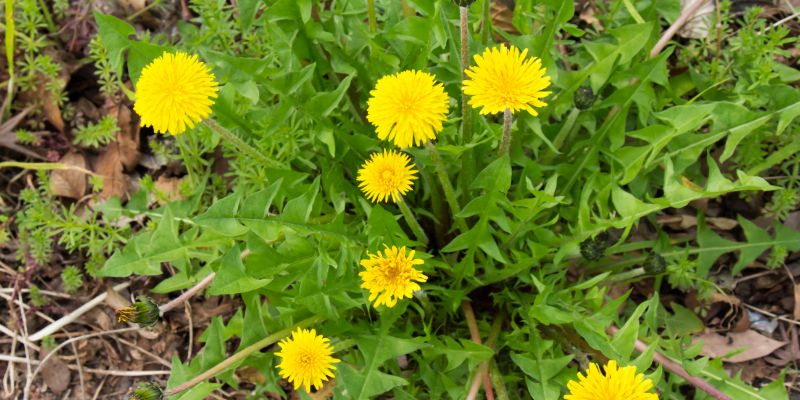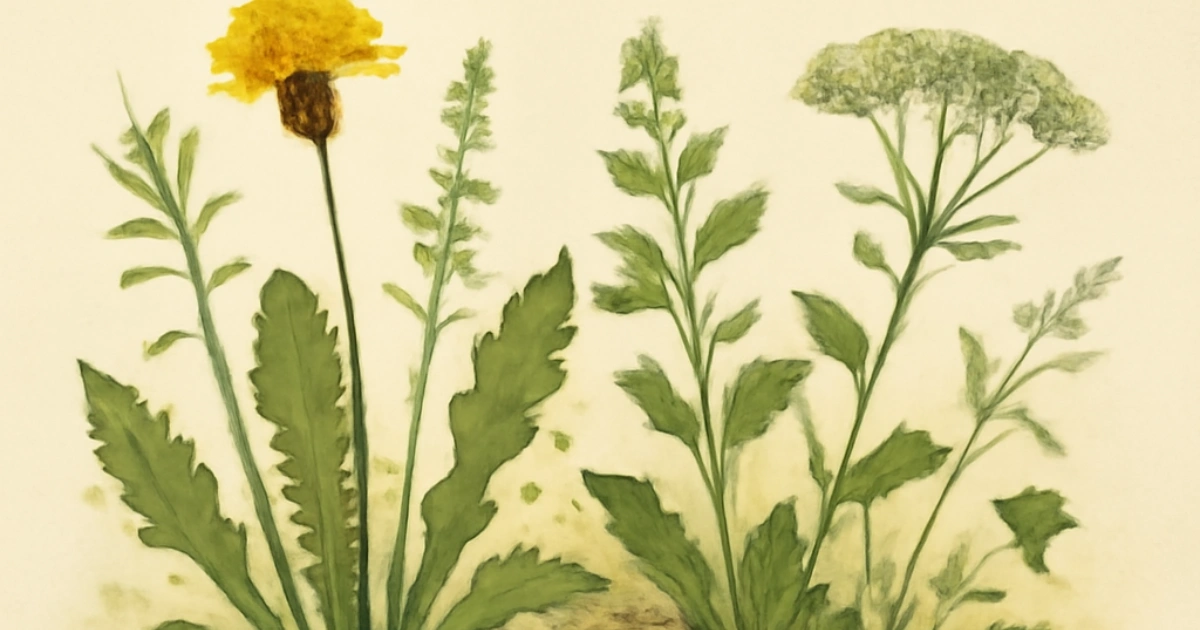Weeds — often despised and unwanted in gardens and fields — are the unsung heroes of nature. These resilient plants thrive in places where cultivated plants struggle, seemingly without permission. While gardeners and farmers view them as intruders, weeds serve a purpose far beyond being a nuisance. These wild plants, left to grow freely, play a crucial role in the fertility of the soil, promoting biodiversity, and contributing to the natural cycle of life.
In this article, we will explore the wild power of weeds, their surprising benefits, and how they can transform barren soils into fertile grounds. Join us in discovering the untold story of these rebels of nature, as we delve into their crucial role in agriculture and gardening.
Why Weeds Are More Than Just a Nuisance 🌾
When we think of weeds, words like “unwanted,” “disruptive,” and “chaotic” often come to mind. These plants push through the soil without invitation, growing rapidly and often in places where we least expect them. However, these so-called “mauvaises herbes” (bad herbs) are far from being mere intruders. They are pioneers of life, capable of thriving in the harshest conditions and restoring balance to disturbed ecosystems. Let’s take a closer look at why weeds deserve more respect than they often get.
1. Soil Enrichment and Fertility 🌱
Weeds are natural soil enrichers. Many of them have deep root systems that break up compacted soil, allowing air, water, and nutrients to reach deeper layers. Their roots often absorb minerals from deep within the ground, bringing them to the surface where other plants can benefit. As weeds decompose, they release these nutrients into the soil, increasing its fertility.
- Nitrogen Fixation: Some weeds, such as clover, have the ability to fix nitrogen from the air, making it available for other plants. This process naturally replenishes the soil’s nitrogen levels, which is crucial for plant growth.
- Organic Matter: Weeds contribute to the organic matter in the soil. When left to decompose, they provide valuable compost that enhances soil structure and increases its water-holding capacity.
2. Erosion Control 🌾
In areas where soil erosion is a problem, weeds act as natural protectors. Their dense roots bind the soil together, preventing it from being washed away by wind and water. This is especially important in regions where the soil is bare, such as newly plowed fields or construction sites.
Weeds like dandelions and grasses are particularly good at stabilizing the soil. By providing ground cover, they reduce the impact of rainfall on the soil’s surface, thus preventing erosion and improving the overall quality of the soil.

3. Biodiversity and Habitat Creation 🦋🐝
Weeds play a significant role in supporting biodiversity. They provide food and shelter for a wide range of insects, birds, and small animals. Many of these insects, such as pollinators like bees and butterflies, depend on weeds for nectar, pollen, and habitat.
A healthy population of weeds can create a diverse ecosystem, providing niches for various species. These plants offer protection for insects, act as nurseries for larvae, and provide food for herbivores. Weeds, therefore, form the foundation of many ecosystems and contribute to a balanced and thriving environment.
4. Resilience and Adaptability 💪
What makes weeds so special is their resilience. These plants are the ultimate survivors. They grow in the most inhospitable conditions, adapting to environmental stresses such as drought, poor soil quality, and extreme temperatures.
Weeds have evolved to thrive without human intervention, often in conditions where cultivated crops struggle to grow. Their ability to adapt quickly and spread makes them the pioneers of soil recovery. In this way, they prepare the ground for future generations of plants by creating a more hospitable environment.
5. Weeds in Permaculture and Organic Farming 🌍
In permaculture and organic farming, weeds are seen as allies rather than enemies. Instead of eradicating them, farmers and gardeners embrace weeds as part of the natural cycle. Many organic farmers use weeds as mulch, ground cover, and green manure, helping to create self-sustaining systems that don’t rely on synthetic fertilizers or pesticides.
Weeds can also help control pests by attracting beneficial insects or acting as a deterrent to pests that prefer cultivated crops. By working with weeds, gardeners can foster healthier, more resilient ecosystems that require fewer external inputs.
Common Mistakes in Dealing with Weeds and How to Avoid Them ❌
While weeds are beneficial, many gardeners make common mistakes when it comes to managing them. These mistakes can lead to more harm than good. Here are a few things to keep in mind:
1. Overusing Herbicides 🚫
Using chemical herbicides to kill weeds may seem like a quick fix, but it can lead to long-term damage. Herbicides can harm beneficial insects, pollute the soil, and reduce biodiversity. Instead, try natural weed control methods, such as mulching, manual weeding, or using organic herbicides like vinegar or boiling water.
2. Ignoring the Importance of Weeds in Soil Health 🧑🌾
Many gardeners overlook the role that weeds play in soil health. Rather than pulling out weeds indiscriminately, consider allowing some to stay in place, especially if they’re providing important services like nitrogen fixation or erosion control.
3. Not Recognizing Beneficial Weeds 🌸
Not all weeds are harmful. Some, like clover, dandelions, and chickweed, offer significant benefits to your garden. These weeds can improve soil fertility, attract pollinators, and reduce the need for synthetic fertilizers. Take the time to learn about the weeds in your garden and identify which ones are beneficial and which ones are truly invasive.
Benefits of Weeds for Your Garden 🌻
- Improved Soil Health: Weeds enhance soil structure, increase fertility, and contribute organic matter.
- Pest Control: Certain weeds attract beneficial insects that help control garden pests.
- Water Retention: Weeds help conserve moisture by reducing evaporation and providing ground cover.
- Natural Mulch: As weeds decompose, they act as mulch, protecting the soil from temperature fluctuations and moisture loss.
Tips for Working with Weeds 🌿
Here are some tips on how to work with, rather than against, weeds:
- Use Weeds as Ground Cover: Instead of removing all weeds, let certain types act as ground cover to prevent erosion and retain moisture.
- Mulch with Weeds: Weeds like dandelions can be cut and used as mulch to protect the soil and enrich it with organic matter.
- Incorporate Weeds into Compost: Weeds can be composted to provide valuable nutrients back into the soil.
- Encourage Beneficial Weeds: Some weeds are great for pollinators or nitrogen fixation. Allowing them to grow in certain parts of your garden can improve overall health.
Conclusion 🌍
Weeds are more than just unwanted plants; they are resilient, adaptable, and incredibly beneficial to the environment. They play a vital role in enriching the soil, controlling erosion, supporting biodiversity, and promoting healthier gardens and farms. By recognizing their value and learning to work with them, gardeners can create thriving ecosystems that benefit both plants and wildlife.
So next time you see a weed, think twice before pulling it out. It might just be doing more for your garden than you realize!
Have you ever embraced weeds in your garden? Share your experiences or tips in the comments below!
Vous avez dit :
3 relevant non-competitive external links with recommended anchor texts
ChatGPT a dit :
Here are three relevant, non-competitive external links with recommended anchor texts for your article:
- “The Importance of Soil Health” – Soil Health Institute
Recommended Anchor Text: Learn more about how soil health is crucial for plant growth and ecosystem balance. - “Natural Pest Control in Organic Gardening” – Rodale Institute
Recommended Anchor Text: Explore sustainable pest control strategies for organic gardening. - “Understanding Nitrogen Fixation” – The Nature Conservancy
Recommended Anchor Text: Discover how nitrogen fixation works and its role in maintaining soil fertility.


amoxil online buy – https://combamoxi.com/ amoxicillin brand
diflucan 200mg pills – https://gpdifluca.com/# order diflucan 100mg
order generic cenforce 50mg – https://cenforcers.com/ buy cheap generic cenforce
tadalafil best price 20 mg – https://ciltadgn.com/ india pharmacy cialis
cialis 20 mg price walgreens – https://strongtadafl.com/ cheapest cialis
zantac 150mg usa – https://aranitidine.com/# order generic zantac
cheap viagra bulk – where to buy viagra online order viagra mexico
This is a topic which is near to my fundamentals… Myriad thanks! Unerringly where can I upon the acquaintance details for questions? este sitio
More posts like this would make the online space more useful. https://buyfastonl.com/
The thoroughness in this break down is noteworthy. https://ursxdol.com/synthroid-available-online/
I couldn’t weather commenting. Adequately written! https://prohnrg.com/product/priligy-dapoxetine-pills/
With thanks. Loads of expertise! aranitidine.com
With thanks. Loads of erudition! https://ondactone.com/product/domperidone/
With thanks. Loads of conception!
buy gloperba without a prescription
I am in fact delighted to gleam at this blog posts which consists of tons of of use facts, thanks representing providing such data. http://www.dbgjjs.com/home.php?mod=space&uid=531991
forxiga 10 mg drug – purchase dapagliflozin online cheap dapagliflozin 10mg over the counter
order orlistat – https://asacostat.com/# where to buy xenical without a prescription
This is a question which is virtually to my fundamentals… Diverse thanks! Quite where can I upon the contact details due to the fact that questions? http://zgyhsj.com/space-uid-979405.html
You can keep yourself and your dearest nearby being alert when buying medicine online. Some pharmacopoeia websites operate legally and offer convenience, secretiveness, sell for savings and safeguards over the extent of purchasing medicines. buy in TerbinaPharmacy https://terbinafines.com/product/dapoxetine.html dapoxetine
Thanks for putting this up. It’s well done. viagra professional 100mg prix
Thanks on putting this up. It’s understandably done.
618418 129079I adore your wordpress internet template, wherever would you download it from? 578766
https://t.me/s/iGaming_live/4871
betmgm casino login betmgm-play mgm sports betting
Embrace waves of promotional tides and rewards. In crowncoins, wave after wave of offers await. Ride the wave to riches!
Crave big wins? Sweet Bonanza serves them up with vibrant graphics and high-volatility action. Bonus sweet bonanza strategy buys and ante bets make it even sweeter. Spin away!
Power up your play with authentic Wild West vibes. wonder 4 buffalo brings non-stop thrills via wild herds, multiplier frenzy, and colossal payouts. Your turn to shine!
macumba — free Sweeps Coins, premium slots, real cash prizes. Join thousands of happy players and claim your welcome bonus now. Play today!
Crash, Tower, Limbo, Plinko — stake sportsbook Originals keep players coming back every day. Try them free first.